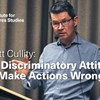someone
Someone to sit next to in the segregated class room
“Who in your class would you not like to sit next to?” This question was posed to almost 5000 pupils (age 14–15) at Swedish high schools 2010/2011. Many adolescents experience systematic rejection duri

Luke Russell - What is forgiveness? On the philosophical disagreements of what forgiveness is
In this episode we are going to talk about forgiveness. Recently Luke Russel, associate professor of philosophy at the University of Sidney, held a research seminar here at the institute titled What i
Brad Hooker: Fairness
Professor Brad Hooker, Philosophy Department, University of Reading. Consider the view that an individual behaves unfairly if, only if, and because (1) The individual treats people who are NOT relevantlAnd(2) The individual fails to treat people who ARE relevantly different in accordance with their relevant difference (e.g., needy/non-needy, someone who has a right against the individual/someone who doesn’t have a right against the individual, etc.).

Mårten Schultz: Risk and responsibility
Legal responsibility comes in different forms. Private law deals with questions of responsibility for harm that someone causes another. The responsibility requires three things: That someone was harme
The Affirmative Answer to the Existential Question and the Person Affecting Restriction
in: Weighing and Reasoning. Themes from the Philosophy of John Broome, Eds.Iwao Hirose and Andrew Reisner, Oxford University Press. The person affecting restriction states that one outcome can only be

Isabela Hazin
I have a bachelor’s degree in Biology from the Federal University of Pernambuco, Brazil, and a master’s degree in Human Evolution and Biology from the University of Coimbra, Portugal. At the Institute , led by and . This project is concerned with the question of how people's opinions on moral issues change over time. More specifically, if this change is mediated by arguments based on Moral Foundations – in a nutshell, whether moral positions (e.g., "against the death penalty") that are more strongly linked to harm and fairness arguments (e.g., "otherwise someone is hurt") spread more easily than those less strongly linked to such arguments. My main job is to help collect, clean, and analyze moral opinion data.
The Value of Existence
in: The Oxford Handbook of Value Theory Eds.Iwao Hirose and Jonas Olson, Oxford University Press. Can it be better or worse for a person to exist than not to exist at all? This old and challenging exis
Seeking a reflective equilibrium in the face of disagreement
Synthese, vol. 204, 86 Abstract How is someone who seeks a reflective equilibrium to respond upon learning that others disagree with her? Regrettably, not much attention has been devoted to that questio

Garrett Cullity: How Discriminatory Attitudes Can Make Actions Wrong
Research seminar with Garrett Cullity, professor of philosophy at the Australian National University, known for his research on moral philosophy. Abstract In general, otherwise permissible actions do

Garrett Cullity: How Discriminatory Attitudes Can Make Actions Wrong
Research seminar with Garrett Cullity, professor of philosophy at the Australian National University, known for his research on moral philosophy. Abstract In general, otherwise permissible actions do








